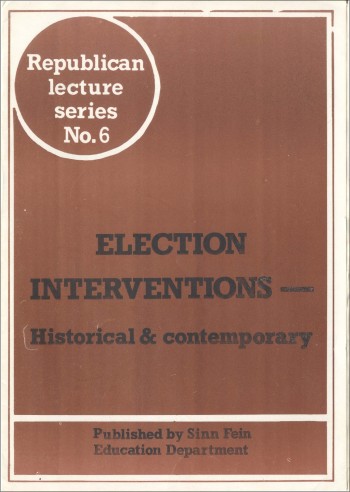Towards a Policy on Culture
Sinn Féin Dréacht pholasaí ar chultúr

| Date: | 1981 |
|---|---|
| Organisation: | Sinn Féin |
| View: | View Document |
| Discuss: | Comments on this document |
| Subjects: | Irish Language |
Please note: The Irish Left Archive is provided as a non-commercial historical resource, open to all, and has reproduced this document as an accessible digital reference. Copyright remains with its original authors. If used on other sites, we would appreciate a link back and reference to The Irish Left Archive, in addition to the original creators. For re-publication, commercial, or other uses, please contact the original owners. If documents provided to The Irish Left Archive have been created for or added to other online archives, please inform us so sources can be credited.
Commentary From The Cedar Lounge Revolution
21st October 2013
Many thanks to the person who scanned and donated this document to the Archive. A brief five printed pages it offers the outline of a policy on culture from that party.
In the Introduction it notes:
We write ‘towards a policy on culture’ because the final policy document of Sinn Féin in this respect will be the attitude, living example and support of the traditional culture of Ireland expressed by the average SF member from day to day.
Although by definition culture is every aspect of the life of an individual, a group or a larger society, what we are concerned about primarily in this document is that which makes up the essentials of the traditional Irish identity, readily recognisable at any period in the history of the Irish people.
According to the experts, by far the most important element in any culture is its own particular language. Thus we agree with the late IRA activist, professor, lecturer and revolutionary writer, Mairtin Ó Cadhain, when he stated: Tosoidh athghabhaíl na hÉireann le hathghabháil.
It continues:
The task before Sinn Féin today, as before the 1918 elections, is to change the perspective of the Irish people, who have the only really essential resource for survival, their determination. The instinct of the Irihs people remains true to tradition: they will continue to support the men of force. If given resolute, scientific and principled leadership, they will restore the Irish language. We believe that only the Republican movement can give them that leadership.
It argues that Sinn Féin itself “should aim to conduct its business through Irish and Irish would be the normal means of communication between Sinn Féin members, new members having to pass through a training programme, including a good working knowledge of Irish, before becoming full members”.
It notes that while SF policy is to use Irish titles for various offices, ‘in recent years there has been a tendency to abandon such terms and to use the English example’. It also suggests that SF members should reject ‘that version of one’s given name or surname which the enemy would have us use, as a formal and permanent act of submission, and the discovery, use and exclusive cultivation of the historic and traditional Irish terms’.
It encourages members of SF to join or support all those organisations that help strength Irish identity at various levels. But it also suggests that members consider ‘it part of SF activities to analyse and uncover the activities of persons and groups organising local events which degrade Ireland and her people (beauty contests, for example) and which bring benefit to tiny gombeen minorities’.
In discussing occasions for the use of Irish it points to cultural events, and also that ‘local national martyrs may be honoured in like manner’ it continues:
Obviously… Christianity is part of the Irish culture (as is unbelief, disbelief, agnosticism and anti-clericalism) and, at the lowest level, that of tacts, at least, it is sensible to facilitate religion as an integral part of the general festivities.
It continues, though:
In such an event, however, it is essential that all the religious beliefs represented locally be invited to contribute. An ecumenical service, in both languages, might be the answer. If there is a local Jewish presence it should not be ignored.
It is interesting that the focus is very much on what SF members can do to encourage their use and the use of Irish more broadly in the society.




Comments
You can also join the discussion on The Cedar Lounge Revolution
No Comments yet.
Add a Comment
Comments can be formatted in Markdown format . Use the toolbar to apply the correct syntax to your comment. The basic formats are:
**Bold text**
Bold text
_Italic text_
Italic text
[A link](http://www.example.com)
A link